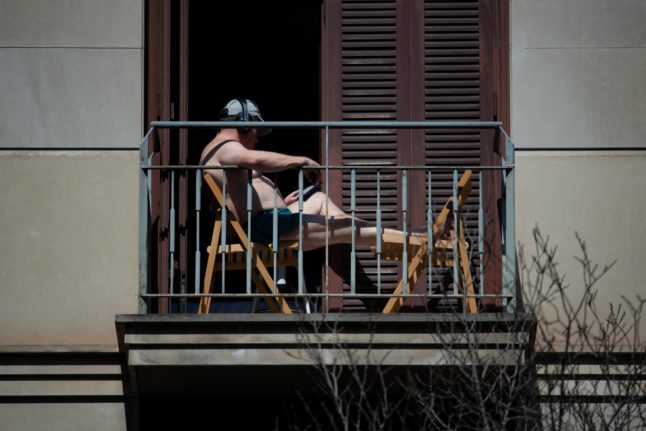November 1st is a public holiday
November 1st in Spain is known as All Saints’ Day or Día de Todos los Santos and is a public holiday across the country – this year it falls on a Wednesday. Major shops are closed, kids stay home from school and many businesses are shut too.
The most traditional activity to do on All Saints’ Day is to go to the local cemetery. Many Spanish families gather together at the cemeteries where their loved ones are buried.
Thursday November 9th is also El Día de la Almudena in Madrid, but it’s only a day off in the capital and not in the Community of Madrid.
November is chestnut season in Spain
La Castañada season or Castanyada in Catalan is held across Catalonia, the Balearic Islands and Aragón and coincides with All Saints’ Day and Halloween, even though it’s a separate celebration. Around this time you’ll find chestnut sellers on street corners, roasting shiny brown chestnuts and big pumpkin-coloured sweet potatoes.
The Basque Country and Navarre have their own versions of it which is known as Gaztañerre Eguna or the ‘día de las castañas asadas’, the day of the roast chestnuts. It is typically celebrated on November 2nd.
More November festivals and events
There isn’t a month in Spain without some type of festival or celebration going on somewhere in the country, and November is no different. November is the time for film festivals in particular with events being held in Seville (24th-29th), Alcalá de Henares (2nd-12th), Huelva (10th-18th), Almería (17th-26th) and Gijón (17th-25th).
There are also several food festivals to enjoy including the Jornadas del Olivar y del Aceite in Baena – events celebrating olives and olive oils; the Orujo Festival in Potes (Nov 10th-12th) in Cantabria where locals show their love of the strong spirit; and the autumn folklore festival of San Martín, or the Humanitarians’ in Aller, Asturias (November 11th).
Squatter demonstration in Barcelona
The okupas or squatters of Plaza de la Bonanova in Barcelona have announced a series of protests on November 30th, the date police have set to vacate both El Kubo and La Ruina buildings. A local judge has ordered the imminent eviction of these two controversial buildings, which have been home to squatters for years.
La Ruina and the adjoining El Kubo building became electoral weapons on the eve of the May 28th election campaign, when representatives of the PP, Valents, Vox and Ciudadanos went to the plaza to show their support for the neighbours, while anti-squatter company Desokupa announced that they would evict the squatters by force.
READ ALSO – Okupas: What’s the law on squatting in Spain?
Asturias to get its first high-speed train to Madrid
Transport Minister Raquel Sánchez recently announced that the high-speed rail network will finally arrive in Asturias on November 29th. Trains will officially begin to offer services from November 30th. Adrián Barbón, president of the Principality of Asturias, has described it as “a milestone in the history of Asturias”.
That’s partly because Asturians have been waiting for many years for the high-speed network to reach their region. The work has taken almost two decades and €4 billion has been invested.
There will be five links a day (in both directions) with Madrid and the travel time – which is currently more than 4 hours – will be reduced by an hour and a quarter. The duration of the journey will be even further reduced when the León-La Robla section is adapted and the Avril trains are incorporated, which can reach speeds of 300 km/h.
READ MORE: Everything you need to know about the new Madrid-Asturias high-speed train link
Major cities to switch on Christmas lights
The Christmas lights may already be up in some of Spain’s major cities, but they have yet to be switched on. Many cities will wait to do this towards the end of November, while some won’t turn them on until the beginning of December.
The Galician city of Vigo will be one of the first to switch them on, on November 18th. This will be followed by Barcelona and Madrid, both on November 23rd, just before Black Friday.
Málaga will wait until Friday, November 24th itself.
Important dates for the self-employed
From the start of 2023, autónomos or self-employed in Spain have had to pay social security payments according to their net income, as opposed to a flat rate. In order for the authorities to help determine how much they should be paying, autónomos can submit their projected earnings for each quarter, various times per year.
Two important dates to remember up until the end of the year will be October 31st – the last day for reporting activities and, where applicable, participation in companies for self-employed workers who were registered before January 1st, 2023.
November 1st will be the other important date to mark in the calendar when a new period will open and you can set a new contribution base. In this case, it not take effect in 2023 and will come into force in January 2024.
READ ALSO: Will you pay more under Spain’s new social security rates for self-employed?
Roadworthiness workers to strike in Valencia region
Unions representing workers for Valencia’s Inspección Técnica de Vehículos or ITV, Spain’s roadworthiness test (similar to MOT in the UK) have called for several days of strikes.
The walkouts are due to occur from October 22nd to November 6th. There will be a number of talks and meetings in the run-up to the stoppages, but if they go ahead, it’s likely that many in the Valencia region will have trouble getting their ITV certificates renewed if they need to during this time.
READ ALSO – ITV: How to pass Spain’s roadworthiness test (and the changes for 2023)
Clocks go back
Technically, the clocks change on Sunday, October 29th at 3am, but it’s in November and the rest of winter that we’ll benefit from the lighter mornings, meaning no more going to work in the dark.
Unfortunately, it also means less light in the evenings, so sunsets will be around 6pm in mainland Spain in November instead of the 7pm that it is now.
Black Friday deals
Although Spain doesn’t celebrate Thanksgiving, it does celebrate the sales on the following day known as Black Friday, on November 24th. This typically means big discounts from some of the world’s biggest brands.
Large retailers participating this year include Amazon, Media Markt and Pc Componentes. Depending on the store or brand, many items can be bought for 40 percent and, in some cases, they even reach 90 percent.
Remember, it’s important to do your research ahead of time to ensure you’re really getting the best deal. Some companies are known for increasing their prices specifically so that they can lower them again for Black Friday.



 Please whitelist us to continue reading.
Please whitelist us to continue reading.
Member comments